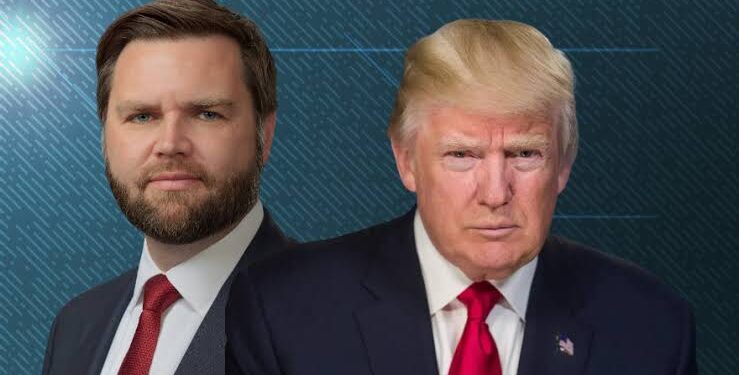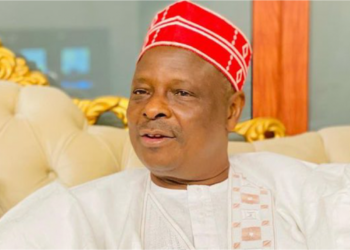Donald Trump has chosen Ohio U.S. Senator J.D. Vance to be his vice presidential running mate, as the Republican Party officially nominated the former president to run again for the White House on Monday at the start of the party’s national convention in Milwaukee.
“As Vice President, J.D. will continue to fight for our Constitution, stand with our Troops, and will do everything he can to help me MAKE AMERICA GREAT AGAIN,” Trump wrote on his Truth Social platform.
According to Reuters, the four-day convention opened in downtown Milwaukee’s Fiserv Forum two days after Trump narrowly survived an assassination attempt in Pennsylvania, and hours after he secured a major legal victory when a federal judge dismissed one of Trump’s criminal prosecutions.
Trump is due to formally accept the party’s nomination in a prime-time speech on Thursday and will challenge Democratic President Joe Biden in the Nov. 5 election.
Vance, 39, was a fierce Trump critic in 2016 but has since become one of the former president’s staunchest defenders, embracing his false claims that the 2020 election was marred by widespread fraud.
Soon after Trump’s announcement, Vance emerged on the convention floor with his wife Usha, shaking hands with and hugging delegates who swarmed the couple.
He smiled widely as he was formally nominated to be vice president and is scheduled to address the convention on Wednesday.
Vance is deeply popular with Trump’s core supporters, but it remains to be seen whether he can broaden the ticket’s appeal.
He shares Trump’s aggressive approach to politics, and his conservative statements on issues such as abortion could turn off moderate voters.
Biden told reporters at Joint Base Andrews in Maryland that Vance is “a clone of Trump on the issues.”
Opinion polls show a close race between Trump, 78, and Biden, 81, though Trump leads in several swing states that are likely to decide the election.
Trump has not committed to accepting the results of the election if he loses.
The head of the main fundraising super PAC supporting Trump’s campaign, Taylor Budowich, said on X that MAGA Inc had raised more than $50 million on Monday.
After the assassination attempt, Trump said he was revising his acceptance speech to emphasize national unity, rather than highlight his differences with Biden.
“This is a chance to bring the whole country, even the whole world, together. The speech will be a lot different, a lot different than it would’ve been two days ago,” Trump told the Washington Examiner.
U.S. District Judge Aileen Cannon’s decision on Monday to throw out federal charges against Trump for retaining classified documents after leaving the White House was the latest in a string of legal wins for the former president, who is due to be sentenced in New York in September for trying to cover up a hush money payment to porn star Stormy Daniels in the weeks before his 2016 election victory.
His other two indictments on federal charges in Washington and state charges in Georgia – both related to his efforts to overturn his 2020 election defeat – are mired in delays and could be significantly limited after the U.S. Supreme Court ruled in July that he had immunity for many of his official acts as president.
“This dismissal of the Lawless Indictment in Florida should be just the first step, followed quickly by the dismissal of ALL the Witch Hunts,” Trump said on Truth Social on Monday, also referencing the prosecutions of hundreds of his supporters who stormed the U.S. Capitol on Jan. 6, 2021.
NO PLACE FOR VIOLENCE
The shooting attempt on Trump’s life immediately altered the dynamics of the presidential campaign, which had been focused on whether Biden should drop out due to concerns about his age and acuity following a halting June 27 debate performance.
Nearly two dozen of Biden’s fellow Democrats in Congress have called on him to end his reelection bid and allow the party to pick another standard bearer.
The focus this week will be squarely on Trump.
Having consolidated party control, Trump could seize on the opportunity to deliver a unifying message or paint a dark portrait of a nation under siege by a corrupt leftist elite, as he has done at times on the campaign trail.
Trump has frequently turned to violent rhetoric in campaign speeches, labeling his perceived enemies as “vermin” and “fascists.”
Biden has cast Trump as a threat to U.S. democracy, comments that some Republicans say helped foster an atmosphere that prompted the shooting even though authorities have yet to determine the motive for the assassination attempt. The gunman himself was shot dead.
Following Saturday’s shooting, Biden sought to lower the temperature after months of heated political rhetoric.
“There is no place in America for this kind of violence,” Biden said in an address from the White House on Sunday.
In an excerpt of an interview with NBC News set to air later on Monday, Biden said it was a “mistake” to tell donors last week it was “time to put Trump in a bull’s eye” but noted that Trump has often used incendiary words.
Biden ordered an independent review of how the gunman, who killed a spectator, could have come so close to killing Trump. Congressional investigators also sought to question the head of the U.S. Secret Service, which is responsible for protecting the former president.
J.D. Vance Once Compared Trump To Hitler, Now Are Running Mates
Eight years ago, in the lead-up to the 2016 presidential election, J.D. Vance was a bitter critic of Donald Trump.
Publicly, he called the Republican presidential candidate an “idiot” and said he was “reprehensible.” Privately, he compared him to Adolf Hitler.
But by the time the former president tapped Vance to be his running mate on Monday, the Ohio native had become one of Trump’s most ardent defenders, standing by his side even when other high-profile Republicans declined to do so.
James David Vance’s transformation – from self-described “never Trumper” to stalwart loyalist – makes him a relatively unusual figure in Trump’s inner circle.
Democrats and even some Republicans have questioned whether Vance, who wrote a bestselling memoir “Hillbilly Elegy” and is now a U.S. senator from Ohio, is driven more by opportunism than ideology.
But Trump, who survived an assassination attempt at a Pennsylvania campaign rally on Saturday, and many of his advisers see his transformation as genuine.
They point out that Vance’s political beliefs – which mix isolationism with economic populism – dovetail with those of Trump, and put both men at odds with the old guard of the Republican Party, where foreign policy hawks and free market evangelists still hold sway.
Republican Senator John Barrasso of Wyoming, whom Vance has described as a mentor, told Reuters that Vance shifted his views on Trump because “he saw the successes that President Trump as president brought to the country.”
In particular, Vance’s vocal opposition to U.S. aid for Ukraine in its war with Russia has delighted Trump’s most conservative allies, even as it has upset some Senate colleagues.
“He understands what Trump is running on and, unlike the rest of the Republican Party in Washington, agrees with it,” conservative commentator Tucker Carlson, a vocal Vance supporter, told Reuters.
Vance, 39, was born into an impoverished home in southern Ohio. His pick may help boost the Trump campaign’s Rust Belt bona fides in a race that will be determined by voters in a handful of battleground states, including nearby Pennsylvania and Michigan, though his conservative views may be a turn-off for moderate voters.
“To the extent that he can do anything for the ticket, it would be to recapture being the voice of the American dream,” said David Niven, an associate professor of politics at the University of Cincinnati who has worked as a speechwriter for two Democratic governors, referring to Vance’s rise from poverty to U.S senator and vice presidential candidate.
After serving in the Marine Corps, attending Yale Law School and working as a venture capitalist in San Francisco, Vance rose to national prominence thanks to his 2016 book “Hillbilly Elegy.” In that memoir, he explored the socioeconomic problems confronting his hometown and attempted to explain Trump’s popularity among impoverished white Americans to readers.
He was harshly critical of Trump, both publicly and privately, in 2016 and during the opening stages of his 2017-2021 term.
“I go back and forth between thinking Trump is a cynical asshole like Nixon who wouldn’t be that bad (and might even prove useful) or that he’s America’s Hitler,” he wrote privately to an associate on Facebook in 2016.
When his Hitler comment was first reported, in 2022, a spokesperson did not dispute it, but said it no longer represented Vance’s views.
By the time Vance ran for Senate in 2022, his demonstrations of loyalty – which included downplaying the Jan. 6, 2021 attack on the U.S. Capitol by Trump’s supporters – were sufficient to score the former president’s coveted endorsement. Trump’s support helped put him over the top in a competitive primary.
In media interviews, Vance has said there was no “Eureka” moment that changed his views on Trump. Rather, he gradually realized that his opposition to the former president was rooted in style rather than substance.
For instance, he agreed with Trump’s contentions that free trade had hollowed out middle America by crushing domestic manufacturing and that the nation’s leaders were too quick to get involved in foreign wars.










